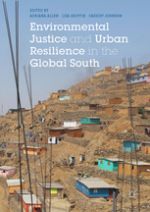Environmental Justice and Urban Resilience in the Global South

This book critically interrogates the normative and analytical links between the concepts environmental justice and urban resilience. The authors start from a critique of the assumed reciprocal normative relationship between these two concepts. Their analyses, however, demonstrate how efforts to achieve either or both hardly ever result in mutually reinforcing positive outcomes.
The three parts of this book critically examine the interactions and the potential co-production of environmental justice and urban resilience from the formal institutional and policymaking perspective (Part 1), to the scale of everyday realities and grassroots initiatives (Part 2), as well as between these two (Part 3). The editors provide introductory chapters to the three parts, which highlight the contributions of each case study to understand the relations between resilience and environmental justice under different modes of governance.
Chapters are based on in-depth and often long-term and repeated engagement of researchers with communities and institutional actors on issues including transport, water and sanitation, housing, electricity, and post-disaster management. The authors’ focus is mostly on urban areas and includes cases across Africa, Asia, Latin America and Eastern Europe. Chapters 7, 9, 11 and 13, in particular, use many visuals like conceptual illustrations, photos and maps to create vivid images of the cities and manifestations of injustices.
The conceptual understanding of environmental justice clearly follows the work of David Schlosberg and his framework of distribution of environmental goods and bads, reciprocal recognition, and parity of (political) participation.
The use and framing of the concept of resilience, on the other hand, is more diverse and follows three broad lenses. First, several chapters focus on resilience as a discourse and urban policy objective. For example, Chapter 4 uses a discursive angle and argues that institutional framings of water poverty, which understand resilience selectively in regard to the scarcity of the natural resource, serve to uphold environmental injustices. Second, authors apply resilience as a way to analyse non-linear dynamics, sudden changes and shocks (Chapter 11). They highlight the shortfalls of rational and mechanistic command-and-control approaches to govern social and environmental issues (Chapter 2). Resilience thinking allows them to bring the importance of self-organization, learning and adaptation to the forefront (Chapter 8), and to emphasize the challenges of striving for self-reliance and reduced vulnerability in regard to food and energy provision in an increasingly interdependent society. A third lens relates to the examination of resilience in relation to environmental justice across different spatial, governance and temporal scales. Chapter 13, for example, analyses temporal dynamics in the creation and consolidation of settlements in the historic centre and peripheries of Lima and how they have been impacted by mapping practices and implementations.
These three broad ways of framing demonstrate how authors explore a variety of case studies and methods to reach a relational understanding of resilience, while benefitting from the normative and analytical guidance of environmental justice. Readers will find that the richness and diversity of the cases enables a more in-depth and critical engagement with both concepts, which have been critiqued as vague, yet remain popular on political and academic agendas.
Book note prepared by Julia Wesely
Search the Book notes database
Our Book notes database contains details and summaries of all the publications included in Book notes since 1993 - with details on how to obtain/download.
Use the search form above, or visit the Book notes landing page for more options and latest content.
For a searchable database for papers in Environment and Urbanization, go to http://eau.sagepub.com/

